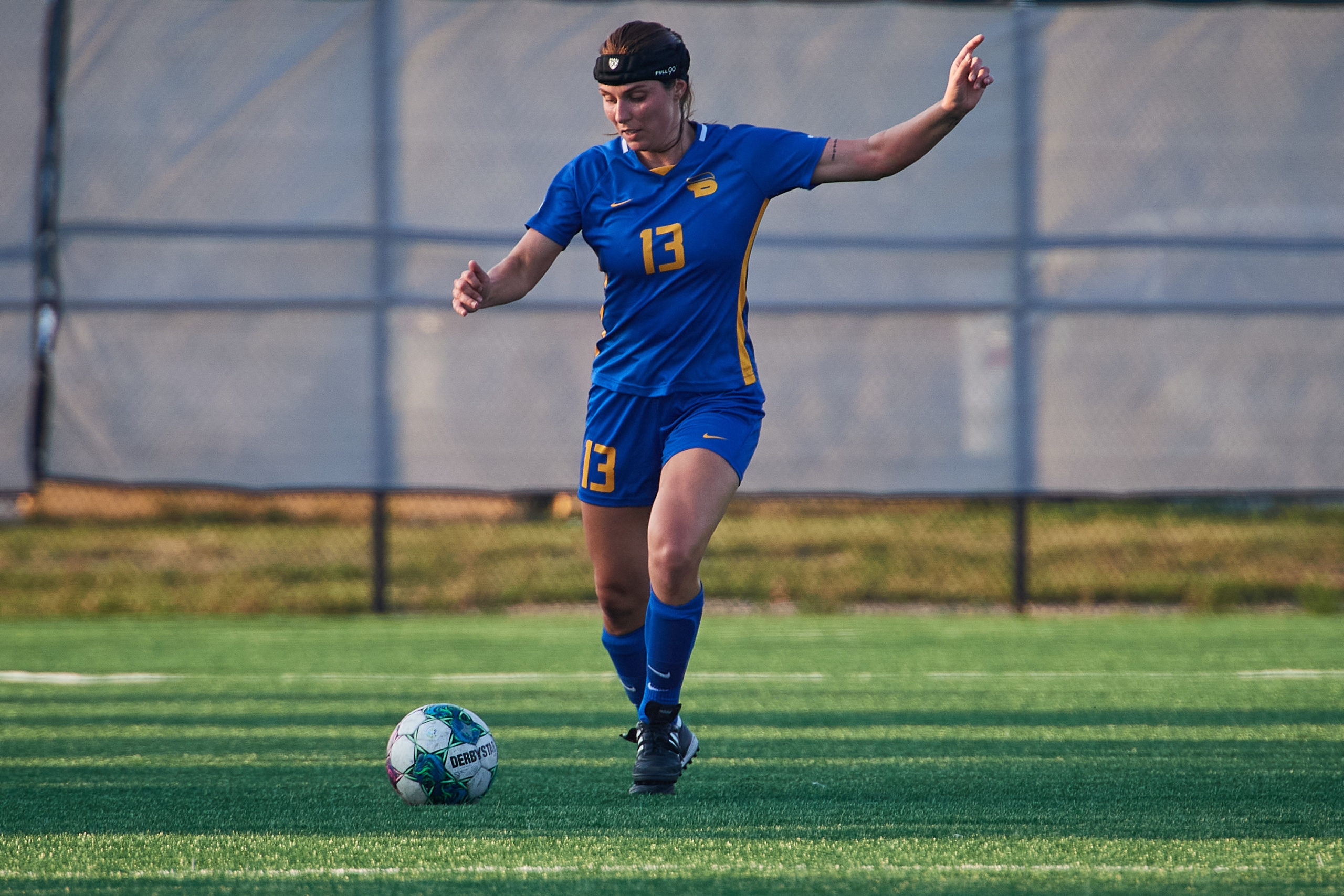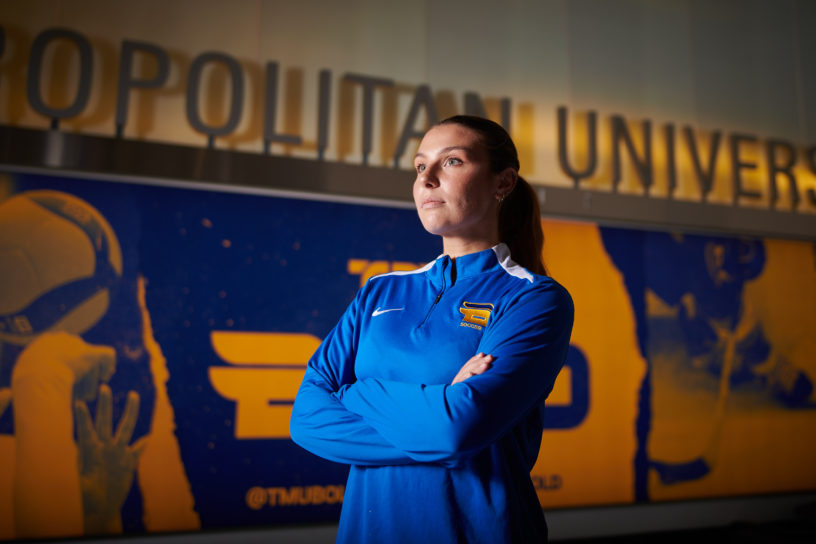By Atiya Malik
Content warning: This story contains mention of serious injury, trauma and related mental health impacts.
“I don’t want to do this anymore,” said Emily Porteous, her voice heavy with defeat. She was reflecting on a chapter of her life she was certain had come to a close. A part of her identity and passion had been torn away.
For years, soccer had defined her and driven her, but in the wake of an injury, it all slipped through her fingers. “That part of my life is done.” The thought echoed relentlessly in her mind, a harsh reality she couldn’t escape.
She couldn’t see it then but that feeling of loss was only the beginning of a much deeper, more profound journey.
Emily is currently a defender in her second stint with the Toronto Metropolitan University (TMU) Bold women’s soccer team but her journey began long before she put on a Bold jersey. She began playing at just four years old and rose through the ranks. After playing with the Oakville Blue Devils FC in League1 Ontario, she made the leap to National Collegiate Athletics Association Division 1 soccer at Canisius University. She later joined the University of West Alabama—it was during a game for them where the trajectory of her life would change.
On Nov. 2, 2018, Emily was playing in a match against the West Florida Argonauts when a seemingly routine play turned into a nightmare. As she leaped to head the ball, an Argonauts player collided with her, crashing Emily’s head against the goalpost. The impact left her unconscious for several hours.
It was this moment that would not only alter the course of her athletic career but challenge everything she knew about her body, mind and future on the field. She briefly made her return to soccer with the Bold in 2021 but three years later, she found herself with the opportunity for one last dance with the game she loves.
“It’s so fantastic to see you out there”
Following the accident, Emily suffered a severe concussion that took her out of academics and off the field for nearly three years. The road to recovery was long but she resolved to rebuild her strength both mentally and physically. She made her comeback in 2021, stepping onto the pitch for the first time with the Bold. This opportunity came after reconnecting with TMU head coach Natalie Bukovec, who had also coached Emily with the Blue Devils. However, after just one season with the Bold, Emily made the decision to leave the team.
“I quit soccer altogether,” Emily said, her voice sharp with certainty. She turned her focus to coaching, convinced that her time risking it all on the field had come to an end.
Two-and-a-half years later, in a surprising turn this summer, Bukovec reached out again. This time, it was an invitation for her to play for the Blue Devils.
“I did not think I was gonna be good enough. I did not think I was deserving of that role,” she said.
After a mental battle with herself, she decided to give playing one last chance. In a match against Scrosoppi FC, Emily realized for the first time in a long time, soccer felt like it always used to.
After the final whistle blew, Emily was approached by John Yacou, head coach of Scrosoppi FC and the current interim head coach for the Bold. What he had to say was the last thing Emily had expected to hear.
“It’s so fantastic to see you out there,” she recalls Yacou saying, his voice full of admiration. “You deserve to be on the field. The game was missing you.”
Those words stayed with Emily. She found herself reflecting on that moment, replaying it over and over in her mind. Weeks later, as she stayed in touch with both Bukovec and Yacou through text it became clear this was the turning point. The barrier of self-doubt that had held her back for so long had finally cracked and she could see it now: her place in the game was still waiting for her.
“At the end of the day, it’s an opportunity to try again. It’s an opportunity to get that final season in soccer that I didn’t think I was ever going to have,” said Emily. “So much has changed in those three years. I would have regretted not coming back, truthfully.”
“When I put it on, it feels like a little superpower”
On Aug. 30, 2024—her first game back with the Bold against the Trent Excalibur—Emily returned with a new mindset and role as an older, returning player.
An important feature of Emily’s return is a concussion band, a piece of headgear she first started wearing in 2021. According to GameBreaker, a protective headgear manufacturer, a concussion band helps to absorb and disperse impact forces, adding an extra layer of protection.
“It’s kind of like a sense of comfort,” Emily said of the concussion band, which she wears only in games, not practices. “When I put it on, it feels like a little superpower. I feel like I can go for absolutely anything and everything while I’m wearing it.”
To Sydney Sherwood, the Bold’s athletic therapist, concussions are one of the toughest injuries to deal with.
“It’s different from other injuries because with those, you can actually see what’s wrong. If you tear your ACL, for example, you know exactly where the injury is and what needs to be done for recovery,” she said. “But with a concussion, it’s not as straightforward. It can’t really be diagnosed through imaging or tests. It’s more about understanding the symptoms and how to manage them.”

Sherwood emphasizes experiencing an injury as serious as Emily’s is incredibly frightening, and even after years of recovery, the mental challenge of returning to a sport after such a traumatic experience is no easy feat.
“It’s natural to feel scared and hesitant, especially when facing physical challenges in the game…Overcoming that mental hurdle is one of the toughest parts of recovery,” said Sherwood.
Although Emily’s accident occurred six years ago, she still grapples with its lasting effects.
“I still deal with things like constant headaches, really bad tension in my traps and neck,” she shared. “The mental health side was especially difficult—extremely bad, way worse than I ever expected. It’s gotten better as I’ve gotten older but those two years after the injury were just awful. I was severely depressed, very anxious and honestly just not okay.”
According to Northwest Functional Neurology, post-concussive brain fog describes an individual’s difficulties with cognitive thinking such as poor concentration, inability to focus and memory issues. For Emily, the brain fog was significant.
“I even noticed that my personality changed in ways that people around me didn’t understand,” she said. “The way I think, feel and even speak, it’s different now. I’ll watch old videos of myself and I don’t even sound like the same person.”
“When you’re dealing with any kind of brain injury or concussion, you have to think long-term”
Despite the challenges she faced, Emily’s concussion band has become an inspiration to those around her. As the head coach of the Richmond Hill Soccer Club’s U13 girls team, she said young players were inspired after seeing her wear the band and go for headers.
“They were amazed and said, ‘Oh my God, I want to wear one too! Does that mean I can go for headers now?’ It really made me realize how much of an impact it could have on others,” Emily explained.
She was also pleasantly surprised when some of the teenage players approached her with questions. “They’d ask, ‘Do you think I should wear one? Does it really help?’ It’s a conversation I never expected to have.”
Now that the 2024 Bold soccer season has come to an end, Emily is eligible to play again next year. She now faces the decision of whether or not to continue.
Emily’s father, Greg Porteous, has been one of her biggest supporters throughout her life. While he is proud of her, he also has concerns, especially for her life-long health.
“When you’re dealing with any kind of brain injury or concussion, you have to think long-term,” he explained. “It affects your future, and that’s what worries me. I’d rather she not play.”
He added that regardless of the decision she makes, he will support her. He just hopes Emily eventually retires from the sport for her own health.
Whether Emily chooses to play another year with the Bold or continue coaching, it’s clear that her passion and dedication will remain central to whichever path she follows.
In the end, an injury does not define an athlete.
“As long as I have the ability to make a change, I don’t want another female player to feel alone,” Emily said. “What’s next is putting my time and effort, on and off the field, to ensure that female athletes are taken care of.”












Leave a Reply